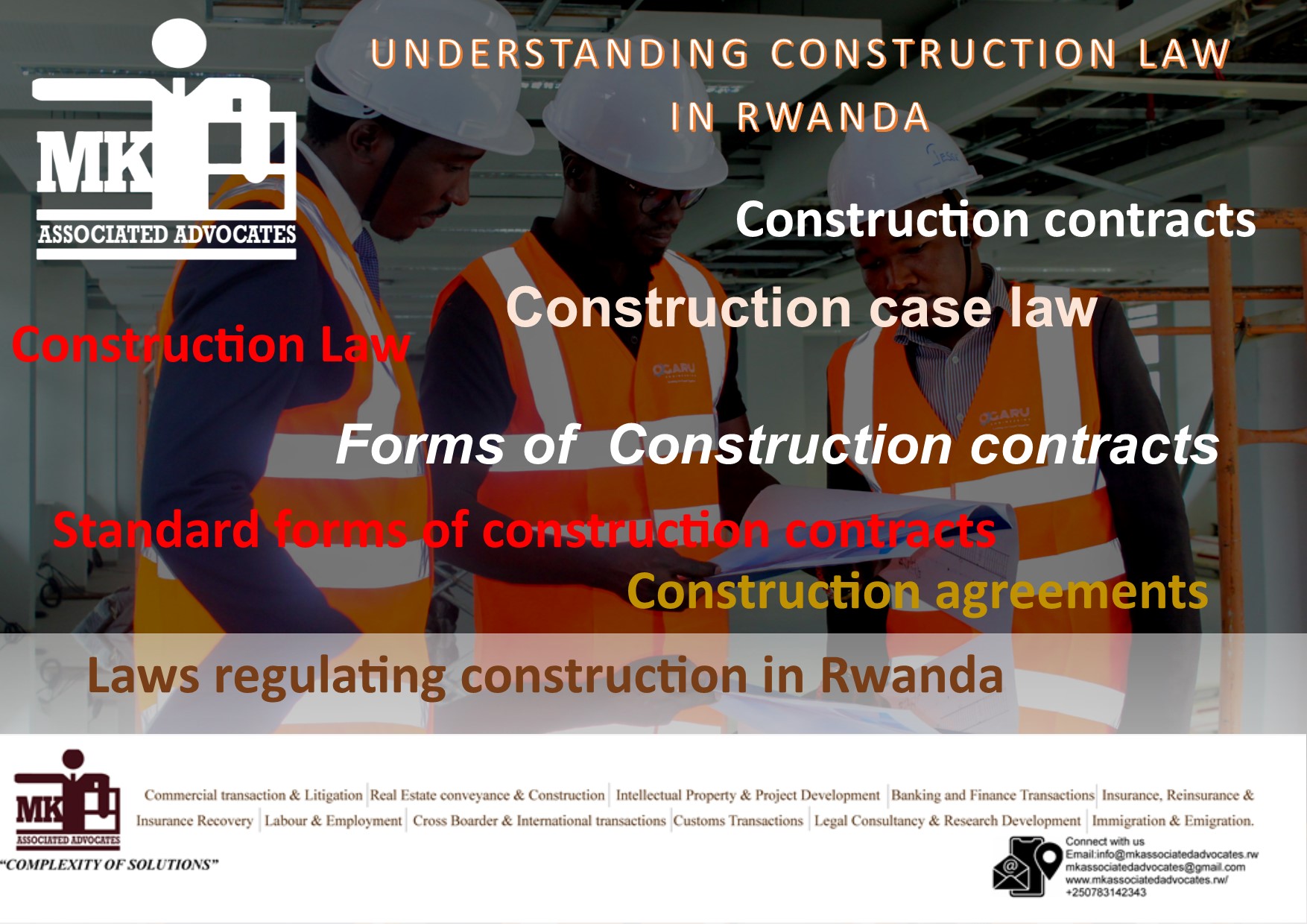
Construction law in Rwanda is a dynamic field that plays a crucial role in shaping the country's infrastructure development and economic growth. This article delves into the legal framework governing construction activities in Rwanda, examining key aspects such as contract formation, dispute resolution, and regulatory compliance. By providing a comprehensive overview of this vital area of law, we aim to shed light on the legal landscape that governs construction projects in Rwanda and highlight the challenges and opportunities facing stakeholders in this sector.
Laws governing construction in Rwanda
There is no specific law that regulates construction in Rwanda, however some of the laws that are used in construction sector include;
• Law N°45/2011 Of 25/11/2011 Governing Contracts in Rwanda (Official Gazette nº 04bis of 23/01/2012)
• Law N°10/2012 Of 02/05/2012 Governing Urban Planning and Building in Rwanda
• Law n°40/2010 of 25/11/2010 establishing the Rwanda Housing Authority (RHA) and determining its responsibilities, organization and functioning as amended. (Official Gazette no 09 of 28/02/2011)
• Law n° 031/2022 of 21/11/2022 governing public procurement (Official Gazette nº Special of 22/11/2022)
Construction Contracts
Most of construction works commence with designs, however, designs remain just a design unless put into execution by a building structure. This not only requires construction engineers but also construction contracts that displays or expresses construction works to be executed, responsibilities of parties and other terms of agreement to govern the owner/ employer or client of the construction project and contractor/ subcontractor. Following are some of the standard construction contracts that are worldwide used in construction sector;
1. JCT
2. NEC
3. FIDIC
4. LOGIC
5. SAJ
Most of the construction contracts in Rwanda are generated from FIDIC form of contracts, however, this doesn’t imply that parties to a construction contract cannot generate their construction contract from scratch without necessarily following any form of a standard construction contract.
Special Provisions in Construction Contract
The forms above are not designed to strictly be used by parties to a construction agreement, parties may either decide to adopt any of the forms or come up with their own original contract that covers their desired terms and conditions. It is therefore to note that construction contracts are like any other contracts, however there are provisions in these contracts that needs to be given critical attention while designing such agreements and some of them are indicated below;
Delay period
This is the kind of provision embedded within a construction contract that indicates the time period of project deliverance or accomplishment. The provision further lays down liabilities of a contracting party (contractor or subcontractor) in case of failure to deliver or accomplish the construction works on an expressed time period. Take an example in the case of A Vs B a commercial case where B was awarded delay damages of Rwf 76.000.000. This was as a result of A’s failure to deliver UPS (Uninterruptible Power Supply) and undertake installment of these UPS on time as it was contracted.
Defective period
This provision is set to protect the client from unnecessary payments that may be requested by the Contractor for correction and rectification of construction works that were not executed in accordance with the contract. This is the period where the Contractor is required to repair any defect.
Retention Period
Construction lawyers always aim at preventing and minimizing risks to the client and in so doing they intensively provide strategies that help in the protection of the client. Retention period is the kind of clause in a construction contract that is aimed at retaining a certain percentage of the contract price such that in case of any failure for the contractor to repair a defect during defective period, the client can repair such defect using the retained portion of the contract price. This like a guarantee assuring the client that the construction works executed by the Contractor meet all construction standards.
Performance guarantee
Construction is a complex sector and if managed poorly, the client may suffer loses, performance guarantee is a kind of financial security requested from the contractor by the client to ensure that the contractor fulfill his or her obligations, preventing the client from suffering loses that may be caused by a defaulting contractor. This is like a commitment made by the contractor that he or she will complete the construction works of the client at a satisfactory manner.
Conclusion
In conclusion, construction law in Rwanda is a multifaceted area of law that is constantly evolving to meet the needs of a rapidly developing nation. The legal framework governing construction activities in Rwanda provides a solid foundation for ensuring the smooth execution of projects, while also safeguarding the interests of all stakeholders involved. By understanding the key principles and challenges within this legal landscape, construction professionals, developers, and policymakers can work together to foster a robust and sustainable construction industry in Rwanda.
Disclaimer on this content should not be taken as legal advice, and MK Associated Advocates will not be held accountable for any legal actions the reader may take referring to this information, but rather can reach out for a formal legal advice(s) and legal opinions at our office on the above address and contacts(http://mkassociatedadvocates.rw/).